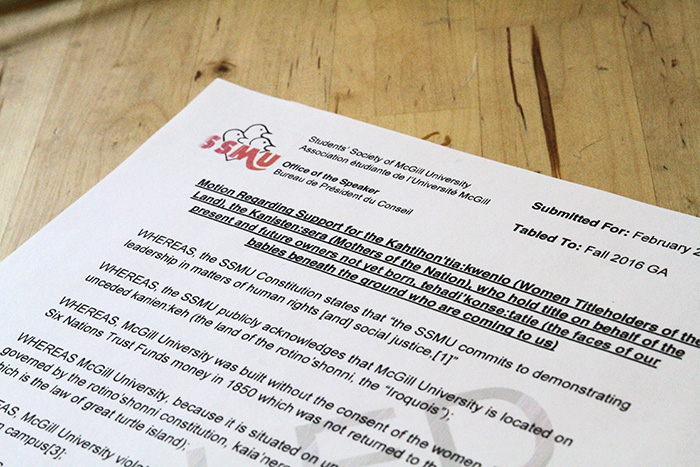At the Students’ Society of McGill University (SSMU) 2016 Winter General Assembly (GA) on Feb. 22, a motion moved by petition was brought forward titled, “Support for the Kahtihon’tia:kwenio (Women Titleholders of the Land).” The motion called for SSMU to stand in support of the Notice of Seizure delivered by a member of the Kahnawake Mohawk community.
The Notice of Seizure asked for McGill University to immediately cease military research on campus and to pay debts owed to the Mohawk Nation. The motion in support of the seizure was first postponed from the Winter 2016 to the Fall 2016 GA, where it was then struck from the agenda by the Executive Committee–made up of the seven SSMU executives–according to SSMU Vice-President (VP) University Affairs Erin Sobat.
“Typically, the motion would have automatically appeared again on the agenda, but in light of the circumstances, the Executive Committee proposed that it be struck when the [Fall 2016] agenda was adopted,” Sobat said. “Christian [Quequish], [SSMU] Indigenous Affairs Commissioner, spoke to the reasoning behind this and members in attendance had the opportunity to ask questions or make comments. For example, if they wanted to argue that it should remain.”
Quequish consulted with members of the Kahnawake community before recommending the motion be removed from the agenda.
“In anticipation of this issue, I did consult with several community members of Kahnawake and was able to determine that the indigenous activist [who delivered the notice] is and continues to act in isolation of the governance systems within Kahnawake,” Quequish said. “After further consultation with indigenous stakeholders in the McGill community, I made the recommendation to the SSMU executives that we act on this. The SSMU executives put forward the suggestion that we strike the motion from the agenda and release a statement explaining why.”
Quequish was critical of the lack of consultation with indigenous students and the indigenous nation when preparing the motion.
“It was found that the movers in question did not consult with indigenous students on campus, or anyone from Kahnawake, before putting the motion forward,” Quequish said. “This is especially problematic considering the tone and scope of the indigenous activists’ claim.”
A statement released by SSMU to members over email says the ‘Women Titleholders’ cited in the motion do not represent Kahnawake in any official capacity.
“The motion presented at the Winter General Assembly is misrepresentative of local indigenous perspectives and stems from selective consultation with activists operating in isolation from traditional governance systems,” read the statement. “In particular, the ‘Women Titleholders’ are not official representatives of Kahnawake, nor do they have the support of the Kahnawake Longhouses or many indigenous students on-campus.”
Quequish was further concerned over events that followed the presentation of the motion at the 2016 Winter GA.
“A further reason for the tabling of the motion is that an indigenous student in attendance protested the motion,” Quequish said. “It was found that following the tabling of the motion, the indigenous student was harassed by the indigenous activist, but only because the movers had given [the indigenous activist] the student’s contact information.”
The 2016 Fall GA was held on Nov. 7 and the motion was not on the agenda.
“Notably, the GA also did not meet quorum, so if it had not been struck the motion would have been deferred to the Legislative Council,” Sobat said. “At this stage, however, the motion has been removed and is not up for future discussion.”
According to Quequish, in the aftermath of this motion, SSMU is looking to implement and better institutionalize consultative processes with indigenous students and communities for motions that will affect them.
“SSMU adopted a policy […] on Indigenous Solidarity last semester [that was put forward by the previous Indigenous Affairs Commissioner],” Quequish said. “We will be using that framework to address gaps in consultation between indigenous individuals, groups, and communities and the larger SSMU community. Also, per the statement, we will be distributing more resources and contacts to students and student groups where appropriate.”
According to SSMU President Ben Ger, the Executive Committee is now looking to update the Solidarity Policy to avoid similar situations.
“The Committee will be looking into ways to amend the Indigenous Solidarity Policy to add in some of those protocols. However, they have not yet been finalized,” Ger said. “The process of developing consultative protocols would primarily be handled by the Indigenous Affairs Commissioner and the Indigenous Affairs Committee, with support from [the VP External David Aird, the VP University Affairs Erin Sobat], and myself.”








